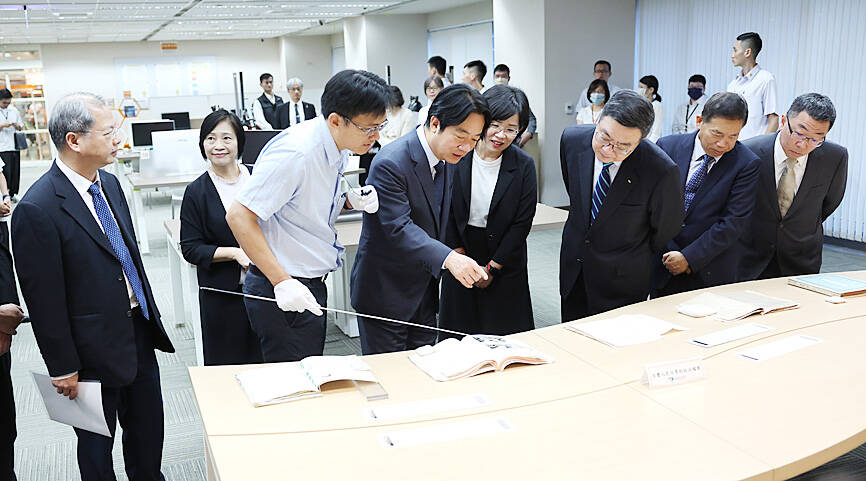Democracy should not be used against democracy, President William Lai (賴清德) said during a visit to the national archives on Commemoration Day of the Lifting of Martial Law yesterday.
Lai and Premier Cho Jung-tai (卓榮泰) visited the National Archives Administration and its reading center to review declassified records from the 228 Incident and the Martial Law era, including documents promulgated by the then-government under the National Security Act During the Period of National Mobilization for Suppression of the Communist Rebellion.
Lai said that as Tainan mayor in 2014, he observed the anniversary of the death of Tang Te-chang (湯德章), a martyr of democracy in the 228 Incident, on Tainan’s Justice and Courage Memorial Day.

Photo: CNA
The archives are a record of the authoritarian government persecuting Taiwanese and also the legacies of those affected during the struggle for democracy, he said.
The archives should appeal to the public to visit, so they could understand that the nation’s democracy would not have existed without the sacrifices made by tens of thousands of their predecessors, he added.
Lai said the martial arts novel The Legend of the Condor Heroes (射鵰英雄傳) written by late novelist Jin Yong (金庸) is one of his favorite books and it was banned during the Martial Law era.
The novel was prohibited as the government did not want Taiwanese reading stories about gallant people rising up against corruption, agency research fellow Hsu Feng-yuan (許峰源) said, adding that censorship adversely affected people’s lives.
The declassification rate of the archives has reached 99.96 percent with only 26 documents still classified, while information originally approved for permanent classification that has yet to be transferred amounts to 4,556 documents from eight cases, National Archives Administration Director-General Lin Chiu-yen (林秋燕) said in her briefing.
The agency has requested a review of the declassification and downgrading of classified records by Aug. 27, she added.
Records deemed to contain national security information should be declassified after a maximum of 40 years, with only three exceptions — if declassification could imperil intelligence agents who have collected information against China, could seriously impact national security or external relations, or could jeopardize intelligence collection against China, Lin said.
Extension to the classification period of these exceptions must be submitted to a national security meeting for approval with a maximum of three years for each extension, she said.
Cho in his speech said that Taiwan has built a democratic system after the world’s second-longest martial law of the modern era.
Declassification of the records is so the nation can be honest with historical facts and be accountable to those affected and their families, he said.
To remember history is not to remember hatred, but to prevent history from repeating itself, Cho said, citing prestigious Czech novelist Milan Kundera: “The struggle of man against power is the struggle of memory against forgetting.”
Separately, the military honor guards performed their first guard mounting at Democracy Boulevard in Taipei yesterday, after ceasing their 44-year sentry duty at the Chiang Kai-shek Memorial Hall at 5pm on Sunday.
The Ministry of Culture said the sentries were removed to fulfill transitional justice.

TRUST: The KMT said it respected the US’ timing and considerations, and hoped it would continue to honor its commitments to helping Taiwan bolster its defenses and deterrence US President Donald Trump is delaying a multibillion-dollar arms sale to Taiwan to ensure his visit to Beijing is successful, a New York Times report said. The weapons sales package has stalled in the US Department of State, the report said, citing US officials it did not identify. The White House has told agencies not to push forward ahead of Trump’s meeting with Chinese President Xi Jinping (習近平), it said. The two last month held a phone call to discuss trade and geopolitical flashpoints ahead of the summit. Xi raised the Taiwan issue and urged the US to handle arms sales to

A magnitude 5.6 earthquake struck off the coast of Yilan County at 12:37pm today, with clear shaking felt across much of northern Taiwan. There were no immediate reports of damage. The epicenter of the quake was 16.9km east-southeast of Yilan County Hall offshore at a depth of 66.8km, Central Weather Administration (CWA) data showed. The maximum intensity registered at a 4 in Yilan County’s Nanao Township (南澳) on Taiwan’s seven-tier scale. Other parts of Yilan, as well as certain areas of Hualien County, Taipei, New Taipei City, Taoyuan, Hsinchu County, Taichung and Miaoli County, recorded intensities of 3. Residents of Yilan County and Taipei received

Taiwan has secured another breakthrough in fruit exports, with jujubes, dragon fruit and lychees approved for shipment to the EU, the Ministry of Agriculture said yesterday. The Animal and Plant Health Inspection Agency on Thursday received formal notification of the approval from the EU, the ministry said, adding that the decision was expected to expand Taiwanese fruit producers’ access to high-end European markets. Taiwan exported 126 tonnes of lychees last year, valued at US$1.48 million, with Japan accounting for 102 tonnes. Other export destinations included New Zealand, Hong Kong, the US and Australia, ministry data showed. Jujube exports totaled 103 tonnes, valued at

BIG SPENDERS: Foreign investors bought the most Taiwan equities since 2005, signaling confidence that an AI boom would continue to benefit chipmakers Taiwan Semiconductor Manufacturing Co’s (TSMC, 台積電) market capitalization swelled to US$2 trillion for the first time following a 4.25 percent rally in its American depositary receipts (ADR) overnight, putting the world’s biggest contract chipmaker sixth on the list of the world’s biggest companies by market capitalization, just behind Amazon.com Inc. The site CompaniesMarketcap.com ranked TSMC ahead of Saudi Aramco and Meta Platforms Inc. The Taiwanese company’s ADRs on Tuesday surged to US$385.75 on the New York Stock Exchange, as strong demand for artificial intelligence (AI) applications led to chip supply constraints and boost revenue growth to record-breaking levels. Each TSMC ADR represents